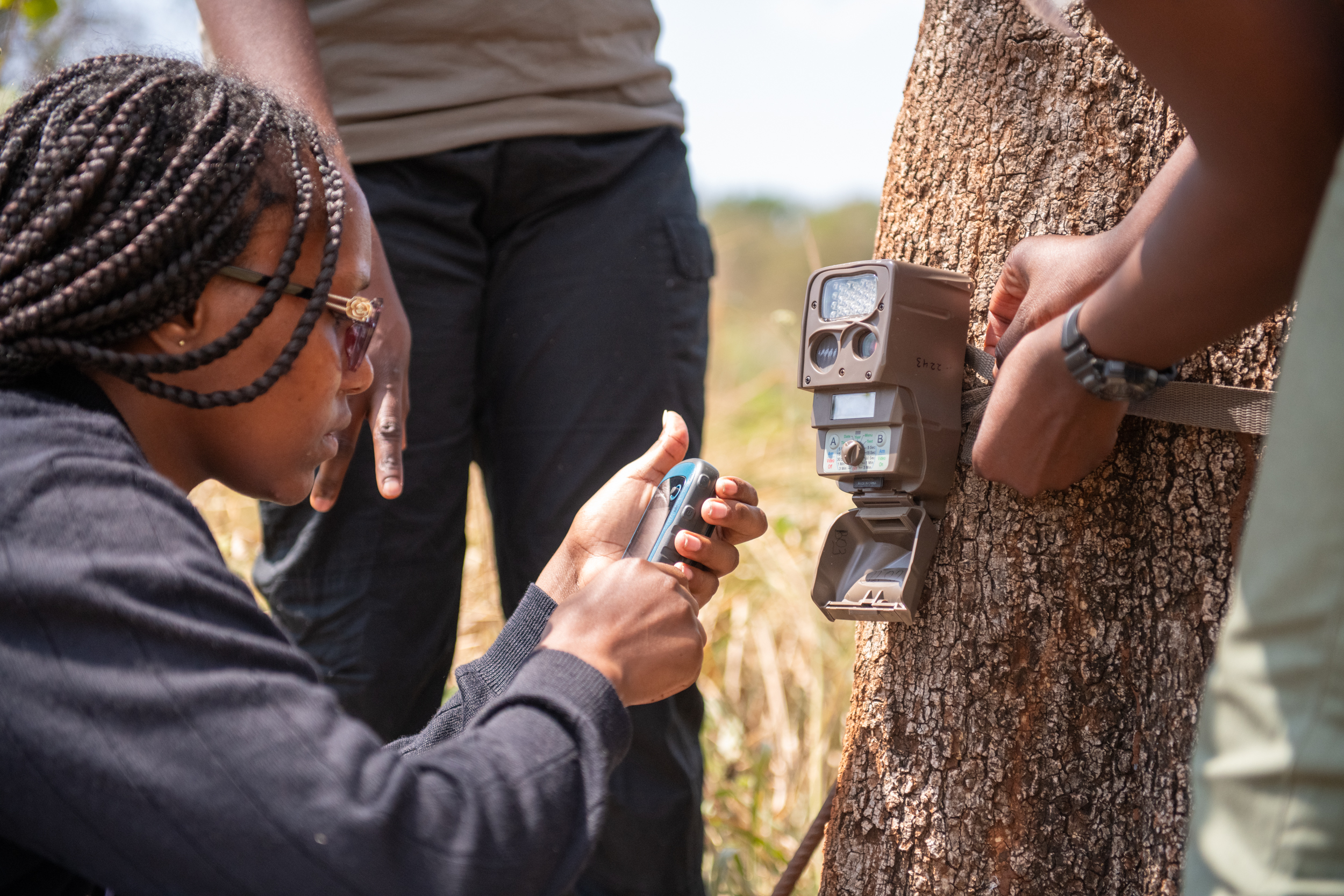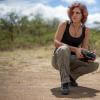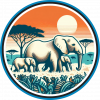Back for a second year, the Women in Conservation Technology initiative selected 10 emerging female conservation leaders to join our first Tanzanian cohort. During a six-month comprehensive training programme, which included two in-person workshops and hands-on internship experiences, our participants received an immersive introduction to a wide range of essential conservation technology tools. These foundational trainings were complemented with mentoring and networking sessions led by established Tanzanian women in the conservation technology field. Armed with new technical knowledge and the support of a regional network of empowered women, our cohort is ready to redefine the future of conservation in East Africa and beyond.
Empowered to action: Watch as Eliminatha Ambross, a member of the 2023 Women in Conservation Technology cohort, uses technology tools to make a tangible impact in the field.
The Women of WiCT
After reviewing nearly 150 highly qualified applicants, we faced the daunting task of selecting ten exceptional candidates for our second Women in Conservation Technology cohort. These women brought diverse experiences and interests, from a graduate student studying cheetah landscape use to an intern mapping the distribution of Tanzanian birds. Each applicant demonstrated exceptional dedication to protecting Tanzania’s wildlife and a keen interest in exploring new tools to elevate their conservation practice.
“[I am] excited for the opportunity to see the integration between the technology advancement and conservation efforts to more efficient and effective conservation strategies.”
Beyond their involvement with wildlife preservation, this cohort also brought unique personal experiences in sustainable livelihoods, conservation education, and human-wildlife conflict mitigation. These women saw clear connections between these core conservation components and the technology's potential to support and empower local people. “I want to help the local communities to apply appropriate scientific technology to monitor their biodiversity and at the same time safeguard the local community interests,” shared one candidate.
Participants were also selected based on their desire for community and commitment to supporting and uplifting others. “I believe through this program I will meet with other experienced women who will transform my mind,” said a participant.

Throughout the programme, participants were encouraged to identify areas where they could support each other to foster a collaborative environment for learning and growth. Read more about the women of our 2023 cohort here and follow updates from their conservation work on the Women in Conservation Technology WILDLABS group.
Hands-on training: teaching technology in the field
Our 2023 programme consisted of two immersive field workshops that bookended five months of hands-on conservation technology learning and application. Drawing on insights from last year's cohort, we collaborated with Tanzanian partners to refine our program, ensuring our trainings align with local needs and offers valuable support within the local context.
Our first in-person workshop was held at the Grumeti Reserve in the stunning Serengeti in Tanzania. We were privileged to use the newly established educational facilities at Research and Innovation for the Serengeti Ecosystem (RISE). Grumeti specifically designed these Facilities to host events aimed at enhancing the skills of Tanzanians and fostering the Tanzanian research community.

During our first week together, we focused on three core applications of conservation technology: wildlife protection, wildlife monitoring, and human-wildlife conflict mitigation. Established female leaders in the field led modules, including Alina Peter Daati, founder of the Tanzanian startup ConTech Africa, which specialises in building capacity around the application of technology to conservation initiatives, and Dr. Libe Massawe, a lecturer in the electronics and engineering department at the University of Dar es Salaam, with expertise in the application of networked sensors to conservation challenges.
These experts provided a gentle yet engaging introduction to diverse technology tools, with lectures grounded in real-world case studies. We explored applications from tracking vultures using GPS tags to sniffing out poachers with detector dogs. Each day, our participants had the opportunity to apply these tools in practical settings, such as tracking elephants and setting up camera traps to capture the animals that visited our camp!

Theory into practice: action and application
After consulting with our local partners, we identified that the most impactful way to build our participants' skills during the interim training period was to offer hands-on experiences with conservation technology. To achieve this, we collaborated with local NGOs and institutions and matched participants who were not already in conservation roles with these paid research opportunities.
Two participants had the chance to do their internship at the Grumeti Fund. Sarah Maagi, supervised the Nelson Mandela African Institute of Science and Technology researchers, analysed a long-term snare dataset to identify poaching hotspots. Eliminatha Ambross helped to maintain a large-scale camera trap survey, engaging with all steps of the data lifecycle, from checking camera traps in the field to classifying images using some of the latest AI software tools.

Eliminatha, who has since won the prestigious Karimjee scholarship to study at Glasgow University, writes:
I am truly grateful for an internship opportunity that I am sure had a significant impact in maximizing my chances of securing the scholarship, as it has hugely added to my field experience.

We are grateful to Grumeti and NM-AIST for providing these invaluable hands-on learning experiences!
Innovation for conservation
With a focus on innovation, our second in-person workshop challenged participants to push beyond conventional conservation technology tools and explore the creation of customised solutions to tackle conservation challenges.
During the workshop, the process of developing bespoke technologies was introduced, and presentations from academics and engineers showcased their new conservation innovations. Dr. Godwin Mruma Gadiel led a hands-on workshop where participants built low-cost open-source hardware to address critical conservation issues, such as rhino tracking and protection.

We also emphasised the importance of communication and collaboration in achieving cross-sector partnerships. Tech sector representatives Rosalie Tribe and Kath Topping led sessions on engaging with the technology sector, covering pitching, proposal writing, and networking skills to unlock conservation impact. Subsequently, our participants worked to develop and pitch proposals on how creative collaborations could elevate current conservation projects.
Lastly, we prioritised fostering a sense of community among our cohort, integrating them with alumni and the broader WILDLABS platform to ensure ongoing growth and contribution to the conservation technology space.

Support for the future: cultivating continued conservation through innovation and impact
My time at RISE has been a valuable learning experience, engaging in various training sessions and participating in diverse fieldwork activities.
The benefits of being in the Women in Conservation Technology cohort do not end at the close of our workshop: thanks to generous support from our partner, Arm, each participant was awarded seed funding to advance their conservation impact by integrating conservation tech tools into their research and application.
With this support, our participants work on various projects, from engaging young people in conservation and developing citizen science apps for local communities to exploring innovative approaches for mitigating human-carnivore conflicts. Several of these projects are forming the backbone of graduate theses or unlocking opportunities for our participants to enter new training programmes in other countries.
With a focus on innovation, partnership, and community-building, our workshop provides a platform for participants to explore new frontiers in conservation technology and propel their projects toward greater impact and success. We look forward to witnessing our participants' continued growth and success as they continue their journey in the conservation technology space!

Join the Journey!
Starting March 25, we're opening up applications for the next cohort of our Women in Conservation Tech Programme in Tanzania, with partners Grumeti Fund, WILDLABS, and Fauna & Flora. If you’re an early-career Tanzanian conservationist who wants to be one of our next ten female conservation technology pioneers, consider applying to join our new cohort!
Click here to learn more about our 2024 Women in Conservation Tech Programme.






Add the first post in this thread.